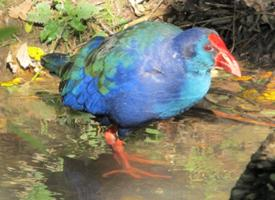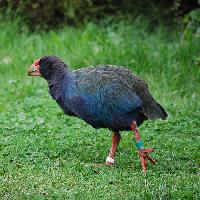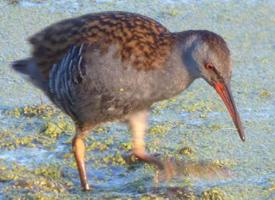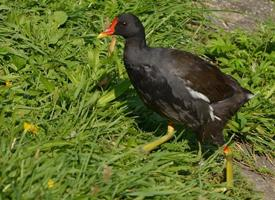
Starea de conservare
| Neînfricat |
Descrierea animalului
The Western Swamphen (Porphyrio porphyrio), also known as the Purple Swamphen, is a striking bird that inhabits the wetlands across a wide geographical area that spans from the Iberian Peninsula and North Africa across to Southeast Asia and the islands of the Pacific. This species is part of the rail family, Rallidae, and is notable for its vibrant plumage and unique behaviors.Adult Western Swamphens are large birds, reaching lengths of up to 50 centimeters (20 inches) and showcasing a hefty build. Their most distinctive feature is their deep purple-blue plumage that covers most of their body, creating a mesmerizing effect when seen against the green backdrops of their natural habitats. The head and neck may exhibit a slightly lighter shade of blue, while the undertail coverts are often a striking white. Juveniles are duller in color, sporting a mix of grey and brown tones until they mature.
One of the most eye-catching aspects of the Western Swamphen is its bill and frontal shield, which are both a bright red or pink, providing a vivid contrast to its blue plumage. Their legs and feet are also a similar red color, which are not only distinctive but also adapted to their wetland environment. These strong, long legs and toes enable the bird to walk on floating vegetation and swim in the water with ease.
Western Swamphens are omnivorous, with a diet that includes a variety of plant material, insects, small fish, and amphibians. They are known to be opportunistic feeders, often foraging in groups to find food in their marshy environments. Their feeding habits play a significant role in the dispersal of seeds and the control of insect populations in their habitats.
Breeding behavior in Western Swamphens is quite interesting, as they exhibit polygamous or cooperative breeding systems. They build large nests in the reeds or on floating vegetation, where multiple females may lay their eggs in a single nest, communally cared for by all members of the group. This social structure is somewhat rare among birds and highlights the complex social dynamics of the species.
Western Swamphens are vocal birds, known for their loud, penetrating calls that can be heard echoing across their wetland homes. These calls serve various purposes, including communication within the group, territory defense, and signaling distress.
Despite their broad distribution, Western Swamphens face threats from habitat loss and degradation, primarily due to human activities such as wetland drainage for agriculture and urban development. However, they have proven to be adaptable and can be found in man-made habitats like rice paddies and sewage ponds, which mimic their natural wetland environments.
In summary, the Western Swamphen is a captivating bird species, both in appearance and behavior. Its vibrant plumage, distinctive physical traits, and complex social behaviors make it a fascinating subject of study for ornithologists and bird enthusiasts alike. Conservation efforts are crucial to ensure the survival of these birds, highlighting the importance of protecting and restoring wetland habitats around the world.
Animale similare
Fotografii noi cu animale
Top 10 animale
- Diana monkey (Cercopithecus diana)
- Dolphin gull (Leucophaeus scoresbii)
- Galápagos tortoise (Geochelone nigra complex)
- Moustached guenon (Cercopithecus cephus)
- Japanese spider crab (Macrocheira kaempferi)
- Colossal squid (Mesonychoteuthis hamiltoni)
- Fox tapeworm (Echinococcus multilocularis)
- Stone loach (Barbatula barbatula)
- Japanese macaque (Macaca fuscata)
- Barbary macaque (Macaca sylvanus)


